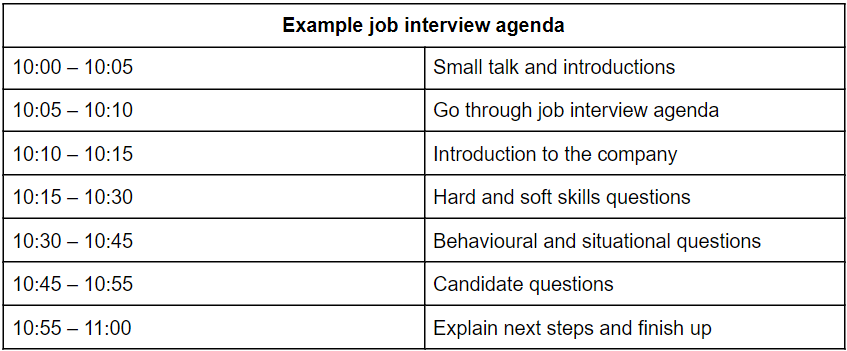How to conduct an interview: best practices for hiring managers
Conducting a job interview may seem difficult at first, but it doesn’t have to be. Below, we’ll guide you through the steps and best practices on how to interview someone to find the best candidate for your job opening.
As a hiring manager, you want to find the best talent to fill your job opening. One important step in this recruitment process is to conduct job interviews with potential candidates.
But how do you properly interview someone? What interviewing techniques to use and which questions to ask?
Effectively interviewing job candidates is about more than just interrogating them on their work experience. And even setting up the interview itself requires a bit of thought and preparation beforehand.
That’s where this article on how to conduct an interview comes in. You’ll find out what interview best practices to follow and which questions to ask your applicant. Simply follow these steps and learn how to interview someone like a hiring pro!
Be prepared: what to do before conducting a job interview
If you enter a candidate interview underprepared, you’re setting yourself up for failure. From something as awkward as forgetting the applicant’s name, to asking the wrong interview questions that don’t match the skills needed for the role.
Poor preparation can ruin your chances of actually finding out whether the candidate is a right fit for the job or not. And this kind of unprofessionalism on your part can harm the candidate’s first impression of you and your company. As a result, they might respectfully decline even if you do decide to invite them for a follow-up interview.
So before you think about how to conduct a job interview itself, ensure you put the right preparations in place.
1. Ensure you attract the right talent
This part comes before the interview stage and lays the groundwork for the steps that follow. After all, you don’t want to waste time interviewing candidates that aren’t even qualified to do the job in the first place, right?
That’s why it begins with attracting the right talent. To do so, you should:
- Write a detailed and clear job description, so you know exactly what role you’re hiring for and what you’re looking for in a candidate
- Create a great job advertisement that sums up this job description and targets the right talent
- Multipost your job ad across the right job boards using JOIN’s free recruitment software.
2. Set up the interview
Once you’ve found qualified candidates, it’s time to actually organise the interview. Although this may seem obvious, you’d be surprised how often hiring managers accidentally invite the wrong people or forget to align internally on who will be leading the interview.
Here’s a quick checklist you can use to ensure you are all set for the interview:
- Decide who joins. Is it an initial screening interview? Then probably just the HR manager or Recruiter is enough. Is it the second or third interview? Then you might want to invite their line manager, (senior) team members, or even the company CEO.
- Set the location (most likely either in the office or virtually).
- Pick a time and date that works for all participants.
- Schedule the right length for the interview. Whereas screening is often short (30 min tops) a third interview can be quite long (1.5-2 hours).
- Create a calendar invite and invite all relevant people. Also schedule an after-interview meeting (or just some time at the end of the interview) with the internal participants to discuss how the interview went.
3. Prepare for the candidate job interview
You’ve found a potential candidate and the interview is scheduled. Awesome! Now it’s time to actually prepare for conducting the job interview. Here’s another checklist with some best practices and things to do when preparing to lead a job interview.
- Recap the job ad. Quickly go through the original job advertisement you created for the job. What is it again you’re after, and what has your candidate actually applied for?
- Study your candidate. You’ve probably gone through their paperwork already when shortlisting applicants, but you want to refresh your memory. Collect and read through the candidate’s CV, portfolio, cover letter, and any other documents that they might have submitted with their application.
- Outline the interview. You want to create a basic overview of how you are going to conduct the interview. When there’s more than one participant, discuss internally who will be leading the interview and share your interview questions and what you want to discuss beforehand to ensure you’re aligned.
- Prepare your questions. One of the most important (and difficult) parts of conducting a job interview is deciding which interview questions to ask your candidate. This not only depends on the role you’re hiring for, but also which step of the interview process you are in, as different steps require different types of interview questions.
Need help coming up with the questions to ask when conducting and interview with a candidate?
Then check out our ever-expanding database of free interview question templates!
Conducting the job interview
The steps described above ensure you are well-prepared and organised. You will go into the interview with confidence and conviction, knowing exactly what you’re going to ask and what answers you’re after.
Now, let’s have a look at how to actually conduct the job interview when the time is there.
1. Opening the interview
Well begun is half done, as the proverb goes. When interviewing someone, you want to ensure that you start on the right foot and everyone is clear on what to expect. Similar to when holding any other business meeting, you will have an agenda that you’re going to follow.
Here are some points to keep in mind when opening the interview:
- Start with some small talk. Yes, you’re all on the clock and you might be tempted to just dive straight in. But a bit of small talk, even something simple like “how was your journey to our office?” can really ease some tension and make everyone feel comfortable.
- Introduce everyone. This includes any other team members that might be joining the interview. Mention who you are, what your role in the company is, and what role you will be taking on during the interview.
- Outline the agenda. Once you’ve all gotten acquainted it’s time to pull out the agenda for the interview. Mention what you will be discussing today and try to give rough estimates of the timing for each step. See an example job interview agenda below.
- Introduce the company. It’s a great idea to further ease into the conversation by explaining more about the company. Since you will do the talking, your candidate can take this time to calm their nerves and settle into the interview. By the time you start asking them questions, they will feel more comfortable, which means you will get much better answers out of them.

2. Conducting the interview: asking the right questions
Now you’re done with all the formalities and pleasantries, it’s time to get down to business. But how do you structure your questions? And what types of interview questions should you ask? In short, this is how to interview a candidate for the job.
Here are some conducting interview tips and best practices on how to structure the actual questioning part of the job interview.
- Start with openers. We always advise starting the interviewing part with one or two general opening questions. These should be easy to answer for the candidate and should give you a bit more of an idea of their background. Example questions include “how did you get into this profession” or “what do you like most about working in this field?”
- Assess both hard and soft skills. If you just ask hard skills questions, you won’t get an idea of how the applicant might function within your team. Just ask soft skills questions, on the other hand, and you might fail to notice they miss a crucial certificate or experience to perform the role. That’s why you should always assess both types of skills.
- Test typical behaviours. “Tell me about a time when you…” Questions like these help you assess how the candidate behaves in certain situations. It allows them to showcase their experience and gives you an insight into how they work.
- Sketch some situations. Behavioural interview questions answer what the candidate has done in previous jobs. Situational interview questions, on the other hand, allow you to test how they might behave in situations that are bound to happen when they work at your company. Try to come up with realistic situations that the candidate is likely to encounter when working on your team.
- Get ready to answer theirs. You want your candidate to ask you questions as well. This shows they have prepared themselves and that they have done their research. But it also gives them the opportunity to test if your company is a good fit for them.
Extra interviewing tip: ensure you take enough notes during the interview. And this should be more than just writing down the candidate’s answers to your questions.
Also try to take notes on things like body language or any red flags that might come up during the interview. Or perhaps you couldn’t answer a great question that they asked that you might want to look into a bit more before interviewing the next candidate.
Be sure to also let the candidate know at the beginning of the interview that you’ll be taking notes. This way, you don’t come across as rude or offensive. Nor will they think they’re doing a bad job every time you note something down!
3. Wrapping it up
This part of the interview should be short but clear. You want to clearly explain the next steps of the interview process to set the right expectations. Instead of just saying “we’ll get back to you”, it’s better to be precise.
An example closing statement to finish the interview:
The next step in the interview process would be a second interview. If invited, this interview will be with me, your potential future line manager, and a senior member of the team. Later today, we will discuss internally how the interview went and decide whether we would like to move you forward to the next step. We will let you know by the end of the day tomorrow at the latest.
After the interview
You’ve made it, congratulations! Ideally, you will meet with all internal participants straight after the candidate has left. This way, the interview and everything that has been said and discussed is still fresh in your mind.
During this post-interview meeting, you should compare each other’s notes and discuss any red flags that might have come up.
Although you might be inclined to straight away make a decision, we advise you to wait at least till the next day before letting the candidate know. This gives all participants a chance to reflect on the interview a bit more. Sometimes, sleeping on it can help tip the scales in a certain direction.
Did the candidate leave a positive impression? Great news! Then be sure to move them on to the next step in your interview process.
Frans Lelivelt
Frans is JOIN's multilingual Senior Content Manager. His main topic of interest in the recruitment space is DEI and how companies can reduce their (unconscious) biases to make the world of work a fairer, kinder place for everyone. Outside of work, he tries to do the same for animals, spending much of his spare time in the kitchen preparing plant-based feasts.

